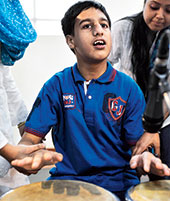 |
| An autistic child performs at ICCR on the occasion of World Autism Awareness Day on April 2. Picture by Anindya Shankar Ray |
“At times, I feel sad because I do not have friends…if I had a few my life would have been different. But you cannot make friends by force, you have to be gentle.”
These were the words of a 15-year-old girl, who discovered she was autistic around two years ago after she found herself struggling with maths, at a programme on the occasion of World Autism Awareness Day.
“Parents of autistic children should see through their children’s harsh exterior. The latter may be jealous and excitable on the outside but very different within,” the Class VIII student of a city school told the audience of autistic children, parents, experts and special educators at the Indian Council for Cultural Relations (ICCR), pretty much summing up the dilemma faced by the autistic because of difficulty to communicate.
The Association for Behaviour Analysis-India had joined hands with the Indian Institute of Cerebral Palsy (IICP) to organise the programme aimed at spreading the word on early intervention, differentiating autism from being mentally challenged. “Discrimination and prejudice increase the sense of helplessness that leads to further discrimination and prejudice,” said Mallika Banerjee, a professor of psychology at Calcutta University.
Special educators have long been advocating fighting for one’s own rights and inclusion. “The objective of this event is to spread awareness about autism so that the society accepts them in the mainstream and does not look down upon them. These individuals have so much potential in them,” said Namita Somani, the patron of ABA-India.
Experts wanted the mainstream schools to be as friendly to the needs of a special child as they were to other students. “There is no dearth of Montessori schools in the city. But few of them have special educators and therapists. If a mainstream school can provide a laboratory for science students, it should also offer a speech therapist for those who need it,” said Krishna Roy, a special educator working with the autistic.
Founder director of Autism Society, West Bengal, Indrani Basu put it more directly. “In the name of inclusion, you cannot exclude our children,” she said.
“Even some inclusive schools in the city do not focus on autism. Parents are also in denial. They forget that early intervention is very important in case of autism,” said Roy, who runs Alokdhara, an inclusive school that offers students Montessori methods, therapies and a sensory room.
The discussion also focussed on the importance of communication. “Children who cannot speak should be offered a second line of communication such as pictures,” Basu said.
An exhibition titled “Beautiful Moments” had on display photographs of the students of Amrit Somani Memorial Centre-Behaviour Momentum, India. The exhibition was inaugurated by Mita Banerjee, the disability commissioner of West Bengal.
The children of Alokdhara and special schools such as Manovikas Kendra, Noble Mission and Riddhi put up a musical show while members of Pradip staged a drama.










